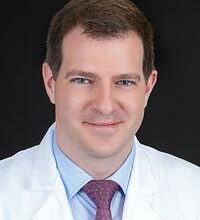Compared to current therapies, chimeric antigen receptor (CAR) T cell therapy can not just suppress the immune system, but partially reset it, interrupting the loop of chronic inflammation and tissue damage caused by autoimmune conditions like myositis. At the International Annual Patient Conference hosted by TMA on September 6-8, 2024, in Baltimore, Maryland, Dr. Maximillian F. Konig, Director of the Cellular Therapy Program (Autoimmunity) at The Johns Hopkins University, spoke about the promise of CAR T cell therapy for people living with myositis.
In his talk he described how B cells, a type of immune cell, are the source of the autoantibodies responsible for myositis. Depleting these B cells can lessen disease activity and, if they are depleted deeply enough, inexperienced (naïve) B cells that don’t produce myositis-specific autoantibodies will emerge and repopulate this immune cell compartment. This elimination of experienced B cells and re-population by naïve B cells, often referred to as “immune reset,” can be accomplished with CAR T cell therapy. This works by directing a person’s own immune system T cells against specific markers (antigens) on the surface of their B cells. When the T cells recognize this marker, they bind the B cells and destroy them.
Binding and activation of T cells occurs naturally in the immune system but directing them to specific cell markers that are shared by all patients for the purpose of treatment requires engineering. With CAR T cell therapy, this is achieved by introducing an engineered protein receptor into T cells. This protein combines components of natural T cell receptors with specific antibody fragments, giving the engineered T cell a new way to bind with desired surface markers that otherwise could not be bound. This engineering is done in a lab after a person’s T cells are collected and the result is a chimeric receptor T cell, where CAR T cell therapy gets its name.
In a series of published case studies, treatment with CAR T cell therapy for autoimmune diseases, including systemic lupus erythematosus and myositis, showed highly encouraging results. Lab values, autoantibody levels, and clinical status improved markedly, and some patients experienced drug-free remission. These results have driven the development of clinical and research programs for new CAR T cell therapies in a wide range of autoimmune diseases.
Additionally, current research is also directed at addressing some of the challenges related to CAR T cell therapy using self-derived (autologous) T cells. For example, bottlenecks exist in cell collection, engineering, and monitoring of patients after receiving cell therapies. These contribute to a labor-intensive and expensive therapy for patients, which is difficult to scale for health care providers and drug manufacturers. The near future of CAR T cell therapy discussed by Dr. Konig will see the use of donor (allogeneic) cells to address both the cell collection and engineering bottlenecks.
Monitoring for toxicities unique to cell therapies is also a significant challenge with current CAR T cell therapies. Typically, clinical trials require inpatient monitoring for 7 to 14 days, with close outpatient monitoring continuing through day 28. The most concerning of these risks include those related to the cytokine release caused by CAR T cell therapy, the potential for infection (requiring ongoing use of antibiotics), and the still uncertain long term-effects of the therapy when used for autoimmune conditions.
Despite these challenges, however, Dr. Konig was optimistic that, for many individuals with myositis, the benefits of CAR T cell therapy will be transformative and outweigh the risks.
Dr. Konig’s talk is available as part of TMA’s International Annual Patient Conference recordings package that is available now for purchase.
TMA’s Winter 2024 issue of The Outlook magazine focuses on cell therapy, including an overview of CAR T cell therapy and a glossary of important terms.
Disclaimer: This content is not intended as a substitute for professional medical advice, diagnosis, or treatment. Always seek the advice of your qualified health care provider with any questions you may have regarding your medical condition.

I would love to be able to try this new procedure. I have Inclusion Body Myositis Do you think it would also work for this
Hello Becky, at this time we are not aware of any company doing clinical trials with CAR T cell therapy for IBM, because the underlying biology is different than other forms of myositis. Nevertheless, there are currently two clinical trials involving IBM: the Abcuro trial and one for Sirolimus. You can find more information here: https://www.myositis.org/research/clinical-trials/clinical-drug-trials/
Hi, are there any clinical trials for Dermatomyositis with Antibody TIF-1 gamma ?
Rita, clinical trials in this rare disease usually aren’t limited to a single antibody. Here is a list of all the clinical trials currently recruiting for myositis diseases: https://www.myositis.org/research/clinical-trials/clinical-drug-trials/
I have statin induced myositis. Will this new car t treatment maybe help me ? I,ve had this problem going on 3 years, I,m getting IVIG and methotrexate treatments but my CK levels are still high 3000+
Benjamin, Yes. Several CAR T trials are now active, and all include NAM as participants. You can find them here: https://www.myositis.org/research/clinical-trials/clinical-drug-trials/